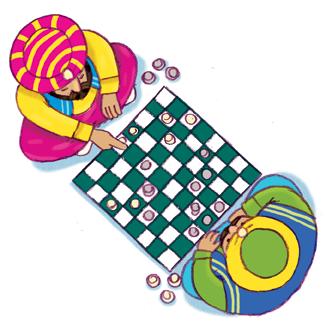Yellow
Green
Blue
Red
Magenta
Remove
LESSON 3 Doubles
A Double Reward

There is an old story about the man who invented the game of chess. His name was Sissa Ben Dahir (da-here) and he was the Grand Vizier (viz-ear) of King Sirham of India. King Sirham was so pleased when Sissa Ben Dahir showed him his new game that he offered a great reward. “Choose your prize,” said the king after he had played his first game of chess. The vizier's reply seemed very foolish to the king: “Today, place one grain of wheat on the first square of the chessboard. Tomorrow, place two grains of wheat on the second square. On the third day, place four grains on the third square. Continue the pattern by doubling the number of grains each day. In this manner, give me enough grains to cover all 64 squares.” The king was glad to grant what he considered to be a small request, so he ordered a bag of wheat brought to the vizier.

However, when the counting began, it became clear that one bag of wheat was not nearly enough. On the first day, one grain of wheat was placed on the chessboard, two grains on the second day, four on the third day, and so forth. As the days passed, the king realized that he could not possibly keep his promise. Some say Sissa Ben Dahir did not insist on receiving his full reward, and the king was again greatly impressed by his wisdom. Others say that the king was so angry that he could not fulfill the request that he cut off Sissa Ben Dahir's head.

- Estimate how much wheat Sissa Ben Dahir asked for. More than 100 grains? More than 1000 grains? More than 1,000,000 grains?
- One way to find out how much he requested is to make a data table. Complete eight rows of the Doubling Data Table in your Student Activity Book.
- Look for patterns.











